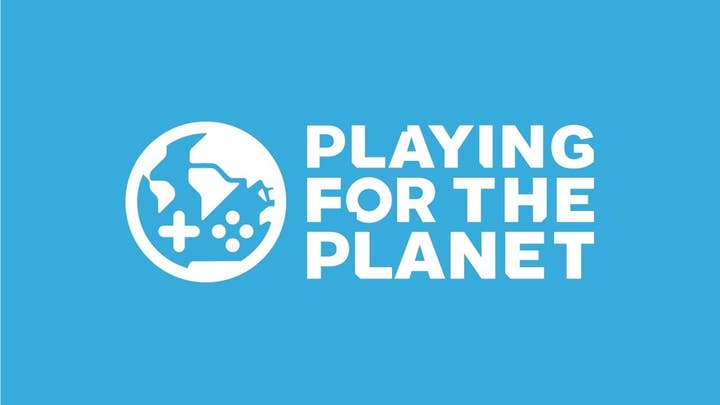People of the Year 2019: Playing for the Planet Alliance
Unifying against climate change is the first of many steps the games industry must take
In September this year, 21 game companies partnered with the United Nations in an effort to reduce the industry's environmental impact. The Playing for the Planet Alliance includes industry giants like Microsoft, Sony, and Google, working alongside smaller companies like Strange Loop and Pixel Berry.
Together, the alliance will see a 30 million tonne reduction in carbon emissions by 2030. This will mostly be achieved through carbon offsets, reducing plastic packaging and e-waste, and including "green nudges" in games to help normalise eco-consciousness. For context, farming in the United States alone is responsible for 574 million metric tonnes of carbon dioxide emissions each year.
The Playing for the Planet Alliance was co-founded by Trista Patterson (along with Sam Barratt, UN Environment; Jude Ower, Playmob; Lou Fawcett, Playmob) from GRID-Arendal a centre in Norway which collaborates with the United Nations on environmental issues. It comes following a report she authored for the UN Environment Programme. The alliance is the first unified attempt by the games industry to take responsibility for its role in climate change. While not a polluting industry like fossil fuel, the environmental impact of the games industry should not be understated, nor should its potential to affect great change.
Patterson told GamesIndustry.biz that it was "an absolute miracle" that the alliance came together, as it all happened on "a wing and a prayer, and less than a whisper of a budget."

Of all the alliance member efforts, Sports Interactive is one of the most deliberate and conscious. Studio director Miles Jacobson announced that the cases for Football Manager 2020 would be made from entirely recycled cardboard. The new packaging is expected to result reduce plastic waste from the game by 20 tonnes.
"We'd be stupid not to do it, and if anyone from other games or entertainment companies is reading this, you'd be stupid not to do it too," Jacobson told us at the time.
The change comes at a cost, however, of around 20p per unit. And therein lies the inherent conflict between environmentalism and profit: it costs money to be green. Of course, 20p per unit isn't a great deal, especially with the increased popularity of digital distribution. But it demonstrates that being green can hurt your margins, and for some companies that's a convenient excuse.
Shortly after the alliance was announced, GamesIndustry.biz reached out to some of the companies which were notably absent. They all declined to comment, and it's not surprising really. Despite the looming apocalypse, climate change is frighteningly easy to just ignore.
"We'd be stupid not to do it, and if anyone from other games or entertainment companies is reading this, you'd be stupid not to do it too"
Miles Jacobson, Sports Interactive
Be honest with yourself. How much do you really care about climate change? No doubt the moral and conscious part of your brain is screaming with indignation at such a question. Of course you're worried about sea levels and extreme weather and mass extinction, but when was the last time you made a consciously environmentalist decision or sacrifice? And we're not speaking about remembering your canvas bag or reusable coffee cup here either.
Have you switched to a green energy provider? Do you still eat meat two or three times a day, everyday? Do you still drive everywhere? Do you still vote for political parties that de-prioritize climate change? Do you throw all your greasy pizza boxes into the recycling along with bits of plastic you're fairly sure are recyclable, but you didn't really check, and it's fine anyway because they have people at the plant to sort that out for you? Fun fact: greasy pizza boxes can contaminate and ruin entire batches of recycled cardboard.
This is not to shame you of course, but rather an attempt to recognise the human shortcomings that unify us all. The science is sound, organisations and political institutions around the world have sounded the alarm bells, and we're weeping in our desperate attempts to extinguish the fire with buckets of Lego: well-intentioned, but obviously not that helpful.
But the biggest problem is that our brains aren't equipped to deal with climate change. It is a threat so cosmic in its scale, so inconceivable in its consequences; it lurks distantly in the unimaginable future.
"Stop worrying about polar bears and oil spills, just kick back and play some Candy Crush. Nothing bad ever happens in Candy Crush"
Climate change breaks us. It makes us feel small, and we are. In this uncaring universe, on a planet of billions, what can a single person do? Well 16-year-old Swedish activist Greta Thunberg has shown that one person can have a big impact, but it is only through rallying the support of millions that she has been able to achieve anything. That's why the Playing for the Planet Alliance is so undeniably important. It is about overcoming that sense of insignificance in the face of a cosmic event. Alone we are powerless, but we don't have to be alone.
This sense of powerlessness plays nicely into our optimism bias. As individuals, we don't believe there is anything we can do. But as a species, we've landed robots on Mars, surely the boffins will figure it out? They will have some perfect solution that will fix everything, and I won't have to make any sacrifices, because science can solve this maddening puzzle.
Our optimism would almost be cute, if it didn't lead to apocalyptic apathy. The fact of the matter is that, in a world that is on the precipice of backsliding into populism, the climate crisis often takes a backseat while our leaders create scapegoats. Corporations are no better, as they try to placate us with shiny baubles and distractions, selling us an idealised world in which everyone is rich, happy, and beautiful. Stop worrying about polar bears and oil spills, just kick back and play some Candy Crush. Nothing bad ever happens in Candy Crush.
It's a distraction, a way of ignoring the truth because the truth is scary. But it doesn't become any less scary by ignoring it. It only gets worse, and each day we drag our feet, or fail to hold those responsible to account, the problem accelerates.
The only way to fight climate change is to overcome our sense of insignificance through unified action. Again, this is why the Playing for the Planet Alliance is so worthy of acknowledgement and support. It's about recognising the immensity of the task ahead of us, rather than shying away. Game companies can and should do more. There needs to be forward thinking solutions. This is an industry of innovation, and we need to apply those creative galaxy brains to this problem.
It's also important here to recognise the alliance's flaws. Perhaps the most egregious is the over-reliance -- especially from larger companies -- to buy their way out of the problem through carbon offsetting. The UN has even said that carbon offsetting is "not a silver bullet solution, and the danger is that it can lead to complacency."
"It is about overcoming that sense of insignificance in the face of a cosmic event. Alone we are powerless, but we don't have to be alone"
It is, if anything, lazy. It discourages consideration of how to make big changes, mollifying the creative drive that's required in the face of this threat. Planting some trees and wiping our hands of responsibility is not going to cut it anymore. There needs to be investment in renewable energy and green technology. We cannot afford to allow data centres to simply continue running on non-renewables. This need only intensifies as content streaming becomes the norm, and we move away from physical media. We are going to require more power, not less, and we're quickly running out of our current poison. We must find a healthy alternative to our crippling oiling addiction.
The Playing for the Planet Alliance is still embryonic. It has great potential, but big and small industry players alike need to get involved. As it stands, the offerings from many companies feel tokenistic at best, and almost wilfully blind to what is actually required.. But there is hope that these small steps will lead to great strides.
Perhaps one of the most powerful tools of the games industry, however, is its reach. With a global audience of roughly 2.5 billion, the games industry has an unmatched opportunity to shape the rhetoric around climate change, challenge preconceptions, and shine a light on the very real and looming danger.
"With gaming poised to be the dominant and most far-reaching media for the emerging generation, its impact and potential can no longer be ignored -- it's a platform with unrivalled potential," reads the Playing the Planet report.
From an entirely selfish and creative perspective, climate change offers fertile ground to tell new stories and develop new experiences. As an artform, you could argue that game developers have a duty to explore climate change through the medium.
As Neuromancer author William Gibson noted: "All imagined futures lacking recognition of anthropogenic climate change will increasingly seem absurdly shortsighted. Virtually the entire genre will be seen to have utterly missed the single most important thing we were doing with technology."
Playing for the Planet Alliance has opened the doors, and invited the world to join. It's a tentative and uneasy first step, the success of which will be defined by how our industry responds. Game companies that don't take this responsibility seriously, that don't accept the invitation to fight climate change as part of a forward-facing alliance, will find themselves on the wrong side of history.









